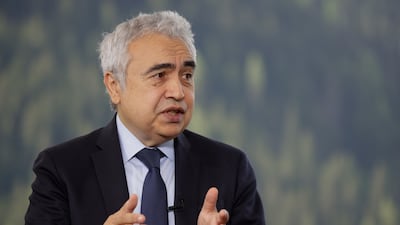The main driver of the growth of renewables is energy security as Russia, a major oil and gas exporter, continues its war in Ukraine, the head of the International Energy Agency (IEA) has said.
Fatih Birol, the IEA’s executive director, was speaking as part of a panel at the World Economic Forum in Davos on Tuesday.
“In the past, renewables, electric cars, [and] efficiency of heat pumps, they were growing, but the main driver was environmental reasons,” said Mr Birol.
But, following the Russia-Ukraine war, "there is also more structural response coming from the countries [policy-wise]", he said.
In May, the EU launched the REPowerEU plan, which comprises measures to tackle the energy crisis triggered by the conflict.
With the help of the programme, the bloc plans to reduce demand for Russian gas, with up to €300 billion ($324.41 billion) in investment.
Meanwhile, the US passed the Inflation Reduction Act (IRA) last year, which offers a series of tax incentives on wind, solar, hydropower and other renewables as well as a push towards electric vehicle ownership.
India, the world’s third-largest crude oil importer, aims to produce 500 gigawatts of non-fossil fuel capacity by 2030 to meet half of its energy demand through renewables.
“We are seeing a big push mainly driven by the industrial policies of the countries … hopefully we will have a secure and clean energy future,” said Mr Birol.
However, there were also calls to standardise policies globally.
America’s IRA legislation, which includes hundreds of billions in federal subsidies for green technology, has been met with some opposition in the EU amid concerns that it would put European companies at an unfair disadvantage.
Jozef Sikela, the Czech Republic’s Industry Minister, called the US subsidies “dangerous” and said European countries would struggle to offer similar terms to clean energy investors.
There is a “completely different” fiscal rule in Europe, where countries are facing 7 per cent to 25 per cent inflation, said Mr Sikela, who was speaking on the same panel.
“It is saying to the European investors go to the US because this is more profitable ... [and] they can get you much cheaper energy than what you can get in Europe,” he said.
Need for funds
Policymakers and industry leaders have raised concerns about the need to financially support clean energy efforts in developing countries.
Investment in renewable energy needs to double to more than $4 trillion by 2030 to meet net-zero targets, the IEA says.
“I think the situation is incredibly clear in the sense that we sort of know where we have got to go and we have to accelerate the speed at which we are going there multiple times,” Martin Wolf, chief economics commentator at the Financial Times, told the panel.
“This will require a staggering volume of resources, a lot of very clever policy and it has to be seen as a global public action programme."
Along with developed countries, China, the world’s second-largest economy and manufacturing hub, will play a key role, the panellists said.
“We have to understand China is the number-one driver of clean energy today with all its pros and cons,” said Mr Birol.
At an event on the weekend, US climate envoy John Kerry criticised the lack of investment in global energy transition efforts, saying not enough money was being “put on the table” to achieve net-zero targets.




























































